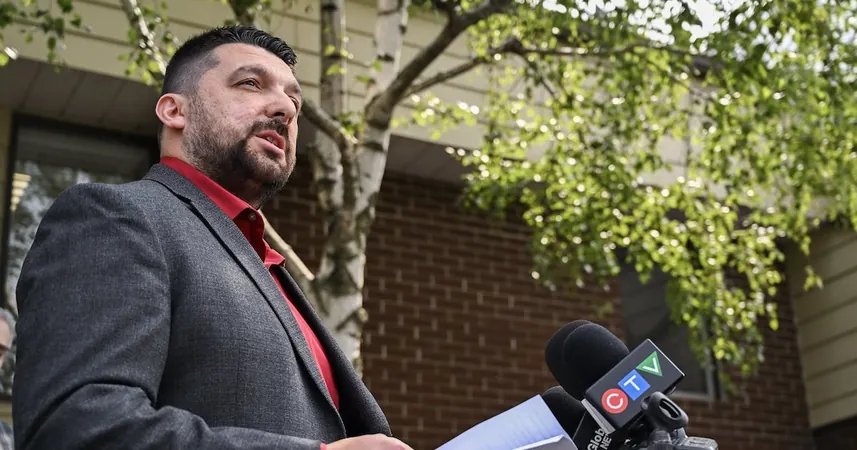
Canada's Immigration Chaos: Why Refusals Are Soaring
2025-06-23
Author: Emily
A New Era of Immigration Refusals in Canada
Canada, known for its welcoming stance towards immigrants, is facing a serious crisis as Immigration, Refugees and Citizenship Canada (IRCC) is reporting an alarming rise in visa and permit refusals. With a staggering 61% increase in denials from high-risk countries, would-be immigrants are left reeling from the fallout of bureaucratic blunders.
The Root Causes of Increasing Refusals
The surge in immigration refusals has raised eyebrows and concerns across the board. What’s fueling this disturbing trend? Let's take a closer look.
1. Overburdened IRCC Systems
The IRCC juggles nearly 2 million applications at any given time. This overwhelming volume leads to overworked officers who may overlook crucial documents or misinterpret guidelines, resulting in erroneous denials. Imagine submitting perfect proof of funds, only to have it dismissed due to a clerical error!
2. Policy Changes and Stricter Requirements
Recent policy alterations have made securing approvals more difficult. As of January 21, 2025, spousal open work permits (SOWPs) became more stringent, and many applicants are caught off guard by new regulations that impact their applications retroactively.
3. Inconsistent Decision-Making
With considerable discretion in decision-making, different visa officers might produce wildly varying outcomes for seemingly similar applications. One applicant could triumph with minor documentation flaws, while another is turned away for minor discrepancies.
4. Miscommunication Perils
IRCC's refusal letters often fail to deliver clear insights, leaving applicants perplexed about the reasons for their denials. Mistakes are not uncommon, such as procedural fairness letters being sent to representatives instead of the applicants themselves.
5. Increased Application Volumes
As Canada garners attention as a prime destination for international students, workers, and immigrants alike, the soaring application numbers put immense pressure on processing times and lead to rushed assessments, increasing the potential for errors.
The Ripple Effects of Refusals
The implications of an IRCC refusal can be catastrophic. Here’s how these denials affect countless hopeful applicants:
- **Emotional Strain:** Facing denial can usher in anxiety about the future, especially for students who lose their chance at invaluable work experience.
- **Financial Toll:** Each new application comes with additional fees, and legal reviews can quickly spiral into thousands in costs.
- **Lost Opportunities:** Refusals can knock students off track academically or keep spouses separated from their partners, straining relationships.
- **Damage to Credibility:** A history of denials can tarnish an applicant's reputation, complicating future immigration efforts.
Key Reasons for Refusals in Different Categories
Below are common denial reasons integrated across various immigration categories driven largely by IRCC errors and applicant oversights.
Visitor Visas
- **Insufficient Proof of Intent to Leave:** A lack of ties to the home country can trigger denials.
- **Inadequate Financial Evidence:** Missing or unclear financial documentation often leads to refusals.
Study Permits
- **Program Relevance Doubts:** If IRCC questions the alignment of an applicant's program with their career aspirations, the application could be turned down.
- **Financial Viability Concerns:** Failure to demonstrate the ability to cover expenses is a common pitfall.
Post-Graduation Work Permits (PGWPs)
- **Ineligible Programs:** Not all educational programs qualify, which can lead to denials upon application.
- **Expired Study Permits:** Timing is crucial; applying after a permit has expired can halt dreams.
Spousal Open Work Permits (SOWPs)
- **Relationship Validation Issues:** Weak documentation can lead IRCC to question the legitimacy of a marriage or partnership.
- **Ineligible Sponsor Occupation:** As of January 2025, only spouses of certain occupational categories can apply.
Permanent Residency (PR) Applications
- **Incomplete Documentation:** Missing critical documents can hinder approvals.
- **Misrepresentation Risks:** Even minor inaccuracies can lead to severe penalties.
What You Can Do After a Refusal
So what happens if your application is denied? Don't lose hope! Here are your options:
1. Reapply
A chance to submit a new application with pertinent corrections.
- **Pros:** No waiting period for most applications, and an opportunity to bolster your case.
- **Cons:** You’ll incur new application fees and risk further denials if old issues persist.
2. Request Reconsideration
This involves submitting an informal request to revisit the decision.
- **Pros:** It can be done without fees.
- **Cons:** Low success rates and uncertain outcomes.
3. Judicial Review
Challenge an unfair decision through the Federal Court.
- **Pros:** Can lead to a reevaluation of your case.
- **Cons:** Often expensive and lengthy.
A Call for Change at IRCC
The rising tide of refusals reveals a pressing need for accountability within the IRCC. Immigrants deserve better clarity, consistency, and fairness in their journeys. Now is the time to advocate for systemic reforms that will streamline processes and ensure transparent communication.
Conclusion: Turning Setbacks into Opportunities
A refusal isn’t the end; it can be a stepping stone to future success in your Canadian immigration journey. By understanding the landscape of refusals and actively seeking ways to address them, you can keep your dreams of living in Canada alive. Stay informed, remain resilient, and continue to pursue what you aspire for—your Canadian future is worth every effort!









 Brasil (PT)
Brasil (PT)
 Canada (EN)
Canada (EN)
 Chile (ES)
Chile (ES)
 Česko (CS)
Česko (CS)
 대한민국 (KO)
대한민국 (KO)
 España (ES)
España (ES)
 France (FR)
France (FR)
 Hong Kong (EN)
Hong Kong (EN)
 Italia (IT)
Italia (IT)
 日本 (JA)
日本 (JA)
 Magyarország (HU)
Magyarország (HU)
 Norge (NO)
Norge (NO)
 Polska (PL)
Polska (PL)
 Schweiz (DE)
Schweiz (DE)
 Singapore (EN)
Singapore (EN)
 Sverige (SV)
Sverige (SV)
 Suomi (FI)
Suomi (FI)
 Türkiye (TR)
Türkiye (TR)
 الإمارات العربية المتحدة (AR)
الإمارات العربية المتحدة (AR)